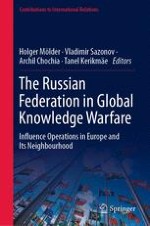2021 | OriginalPaper | Chapter
The Russian Influence Strategy in Its Contested Neighbourhood
Author : Marco Marsili
Published in: The Russian Federation in Global Knowledge Warfare
Publisher: Springer International Publishing
Activate our intelligent search to find suitable subject content or patents.
Select sections of text to find matching patents with Artificial Intelligence. powered by
Select sections of text to find additional relevant content using AI-assisted search. powered by
